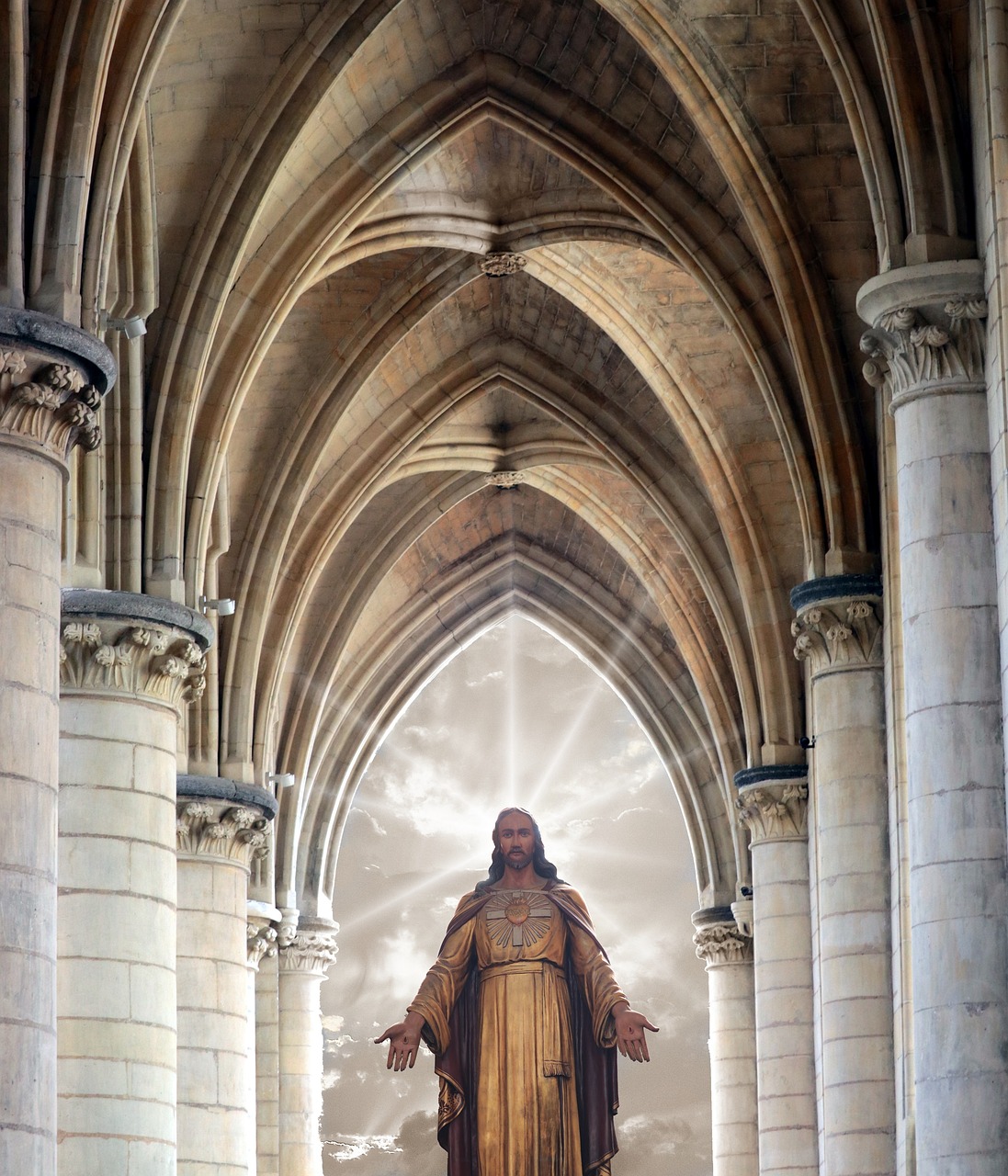In “A Summary of the Bible’s Story: From Creation to Resurrection,” you’ll be taken on a journey through the biblical narrative. Inspired by Bill Wurtz’s “History of the entire world, i guess” video, this summary covers key points in the Bible, from the creation of the world by God to the resurrection of Jesus Christ. It includes significant events such as the fall of humanity, the promise of a future Messiah, the birth and ministry of Jesus, the formation of the early church, and the ultimate redemption of the world. Throughout the summary, you’ll discover the overarching theme of God’s plan for humanity and the promised defeat of Satan. Join us as we explore this captivating story that has shaped the lives of millions.
Creation of the World by God
God’s Act of Creation
In the beginning, before anything existed, there was God. God, who was everywhere and everywhen, created the world even though He did not need to. He spoke, and there was light. He separated the light from the darkness and created the heavens and the earth. God let there be lights in the sky, separating day and night. He separated the waters on earth, creating dry land. And then, God created life. He brought forth plants, abundant with greenery, and filled the waters and the air with animals. Finally, in His greatest act of creation, God made human beings – Adam and Eve.
Formation of the Earth and Universe
At first, the earth was formless and dark, but God’s creation brought light and order. God formed the earth, separating the waters below from the waters above. He shaped the dry land and gave it beauty and purpose. God adorned the sky with the sun, moon, and stars, creating a breathtaking cosmic display. He filled the seas, the skies, and the land with an incredible variety of animals, each perfectly suited to their environment. With His divine guidance, the earth became a place of harmony and provision for all living beings.
Introduction of Adam and Eve
God’s most unique creation was Adam, the first man. He gave Adam dominion over the earth and placed him in a magnificent garden called Eden. God saw that it was not good for Adam to be alone, so He created Eve, the first woman, as a companion and helper for Adam. Together, Adam and Eve enjoyed a perfect and intimate relationship with God, tending to the garden and living in harmony with all creation.
Fall of Humanity through Adam and Eve’s Disobedience
Eve’s Temptation and Adam’s Participation
In the garden, there was one particular tree called the Tree of the Knowledge of Good and Evil that God commanded Adam and Eve not to eat from. However, Eve was tempted by a cunning serpent, who was actually the devil in disguise. The serpent deceived Eve into believing that if she and Adam ate from the tree, they would become like God. Eve gave in to the temptation and ate the forbidden fruit. Adam, who was present with her, also ate the fruit, disobeying God’s direct command.
God’s Punishment and the Introduction of Sin
When God discovered their disobedience, He pronounced punishments upon Adam, Eve, and the serpent. He cursed the serpent, declaring perpetual enmity between it and the offspring of Adam and Eve. To Eve, God proclaimed pain in childbirth and a desire for control over her husband. To Adam, God declared that the ground would be cursed, making it difficult for him to produce food. Sin had entered the world through Adam and Eve’s disobedience, leading to a broken relationship between humanity and God.
Consequence of the Fall in Human History
The fall of Adam and Eve had far-reaching consequences on human history. Sin became a pervasive force, corrupting every aspect of human life. It led to broken relationships, wickedness, violence, and suffering. The consequences of their disobedience affected not only themselves but the entire human race. All humans born after Adam and Eve were bound by sin and separated from God. Humanity needed redemption, a way to be reconciled with God and restored to the perfect relationship that was once lost.

Promise of a Future Messiah
God’s Promise of a Redeemer
Despite humanity’s disobedience and the introduction of sin, God did not abandon His creation. In the midst of pronouncing punishment, God made a promise that one day, a descendant of Eve would bruise the head of the serpent, Satan. This promise, known as the protoevangelium, was the first glimpse of hope that God would provide a savior to redeem humanity from the power of sin and restore humanity’s broken relationship with Him.
Prophecies Regarding the Messiah
Throughout the Old Testament, God sent prophets who foretold the coming of a Messiah, a chosen one who would fulfill the promise of salvation. These prophecies described the Messiah’s lineage, birthplace, character, and mission. The prophets spoke of a righteous and compassionate ruler who would bring peace, justice, and everlasting love. These prophecies created a sense of hope and anticipation among the people, longing for the day when the Messiah would come and bring redemption to the world.
Hope for Salvation and Deliverance
The promise of a future Messiah gave hope to humanity. It reminded them that this fallen world was not their ultimate destiny. They eagerly awaited the fulfillment of God’s promise, knowing that the Messiah would bring salvation, deliver them from sin, and restore their relationship with God. This hope sustained generations, providing comfort and assurance that, one day, all the pain, suffering, and brokenness would be redeemed.
Birth, Ministry, Crucifixion, and Resurrection of Jesus Christ
Jesus’ Birth in Bethlehem
The long-awaited Messiah was born in Bethlehem, a humble town in the land of Israel. Jesus’ birth fulfilled the prophecies that foretold the coming of a Savior from the line of David. He was born to a virgin named Mary and laid in a manger. Angels announced His birth to shepherds, and wise men from the East brought gifts to honor Him. Jesus’ birth marked the beginning of His mission to bring salvation to humanity.
Ministry and Teachings of Jesus
Jesus spent His adult life teaching and performing miracles, revealing the truth about God’s kingdom and the way to eternal life. He preached about love, forgiveness, and the importance of repentance. Jesus challenged the religious leaders of His time, exposing their hypocrisy and calling for a genuine relationship with God. His teachings touched the hearts of many, offering them a new way of living, one characterized by humility, selflessness, and compassion.
Jesus’ Crucifixion and Death on the Cross
Despite His righteous and blameless life, Jesus faced opposition from those who rejected His message. He was betrayed by one of His own disciples, arrested, and put on trial. The religious and political leaders of the time conspired to have Him crucified. Jesus willingly accepted this fate, knowing that His death was necessary for the redemption of humanity. He was crucified on a cross, bearing the weight of humanity’s sin and offering Himself as the perfect sacrifice.
Jesus’ Resurrection and Triumph Over Death
Three days after His crucifixion, Jesus miraculously rose from the dead. His resurrection was a pivotal moment in history, demonstrating His power over sin and death. Jesus appeared to His disciples, establishing the reality of His resurrection and commissioning them to continue His mission. His triumph over death brought hope to all who believed in Him, assuring them that eternal life was possible through faith in Him.

Formation of the Early Church
Pentecost and the Outpouring of the Holy Spirit
After Jesus’ resurrection, He instructed His disciples to wait in Jerusalem for the Holy Spirit. On the day of Pentecost, the disciples were together, and suddenly, the Holy Spirit descended upon them with power and filled them. They began to speak in different languages, enabling them to declare the good news of Jesus to people from various nations who had gathered in Jerusalem. This outpouring of the Holy Spirit marked the birth of the early church.
The Apostles’ Proclamation of the Gospel
Empowered by the Holy Spirit, the apostles boldly proclaimed the message of Jesus’ life, death, and resurrection. They fervently shared the good news of redemption, calling people to repentance and faith in Jesus. The apostles performed miracles, healings, and signs, confirming the truth of their message and attracting many to the Christian faith. Through their preaching, the early church grew and spread throughout the region.
Conversion and Growth of the Early Church
As the apostles preached the gospel, many people responded in faith, accepting Jesus as their Lord and Savior. The new believers were baptized and joined together in fellowship, sharing their lives, possessions, and worship. The early church grew rapidly, even amidst persecution and opposition from religious and political authorities. The unity, love, and devotion of the early Christians served as a witness to the transformative power of the gospel.
Command to Spread the Gospel to All Nations
The Great Commission
Before ascending to heaven, Jesus gathered His disciples and gave them the Great Commission. He commanded them to go and make disciples of all nations, baptizing them in the name of the Father, Son, and Holy Spirit. Jesus assured them of His presence and authority, promising that He would be with them always. The Great Commission underscored the global mission of the church to proclaim the gospel and make disciples, extending the kingdom of God to all corners of the earth.
Missionary Journeys of Paul and Other Disciples
The early followers of Jesus took the Great Commission to heart and embarked on missionary journeys to spread the gospel. The apostle Paul, in particular, played a significant role in establishing Christian communities and proclaiming the message of Jesus in various regions. His travels across Asia Minor, Greece, and Rome resulted in the formation of numerous churches. Other disciples also carried the gospel to different parts of the world, fulfilling the command to make disciples of all nations.
Expansion of Christianity Across Geographical Boundaries
Through the obedience and sacrifice of early Christians, Christianity spread across geographical boundaries. People from diverse cultures and backgrounds embraced the message of salvation, responding to the call of discipleship. The growth of Christianity challenged existing religious and cultural norms, eventually leading to its recognition as a major world religion. By taking the gospel to different lands, the early church laid the foundation for the global reach of Christianity.

Future Return of Jesus Christ
Biblical Prophecies About the Second Coming
The Bible contains numerous prophecies about the second coming of Jesus Christ. These verses speak of His glorious return in power and majesty, where He will judge the living and the dead. The second coming of Jesus is described as a day of reckoning, where the righteous will be rewarded, and the wicked will face eternal punishment. The exact timing of His return remains unknown, but believers are encouraged to be watchful and ready for that day.
The Final Judgment and Establishment of God’s Kingdom
At the second coming of Jesus, there will be a final judgment, where every person will give an account of their lives before God. The righteous will inherit eternal life with God in His kingdom, while the wicked will experience eternal separation from God. This judgment will establish the sovereignty of God’s kingdom, where His reign and rule will be fully realized, and every knee will bow to Him.
Restoration of Creation and Redemption of the World
The return of Jesus holds the promise of the restoration of all things. The Bible speaks of a new heaven and a new earth, where there will be no more pain, sorrow, or death. God will reconcile all of creation to Himself, eliminating the effects of sin and decay. The world will be redeemed fully, and God’s presence will dwell among His people. This future holds the hope of everlasting joy and peace, where humanity will live in perfect harmony with God and one another.
Ultimate Redemption of the World
God’s Plan for the Renewal of All Things
God has a grand plan for the ultimate redemption of the world. His plan encompasses the reconciliation of all creation and the restoration of everything to its original state of perfection. The fallen world we currently inhabit will be renewed and transformed into a place where righteousness and justice prevail. God’s plan includes the unification of heaven and earth, the defeat of evil, and the establishment of His eternal kingdom.
Defeat of Satan and Evil
As part of God’s plan, Satan and evil will be defeated once and for all. The devil, who has been the source of temptation, sin, and destruction, will be cast into eternal punishment. God’s victory over evil will be complete, and the human struggle against sin and suffering will come to an end. The redemption of the world includes the eradication of all evil, ensuring that righteousness and goodness prevail forever.
Eternal Life in God’s Presence
The ultimate redemption of the world holds the promise of eternal life in God’s presence. Believers who have placed their faith in Jesus will experience everlasting joy and communion with their Creator. God’s kingdom will be a place of perfect love, peace, and fulfillment. The pain and brokenness of this present world will be replaced by the fullness of life in the presence of God. The redeemed will dwell with God, enjoying His glory and experiencing the true meaning of abundant life.

Conclusion
The story of the Bible is a narrative of creation, fall, redemption, and restoration. It reveals God’s love for humanity and His desire to bring salvation to a fallen world. The Bible’s story provides hope for a future beyond the present struggles, offering the assurance of ultimate victory over sin, evil, and death. It has shaped human history and continues to impact the lives of individuals and communities. Understanding and embracing the significance of the Bible’s story can bring purpose, fulfillment, and eternal life.







